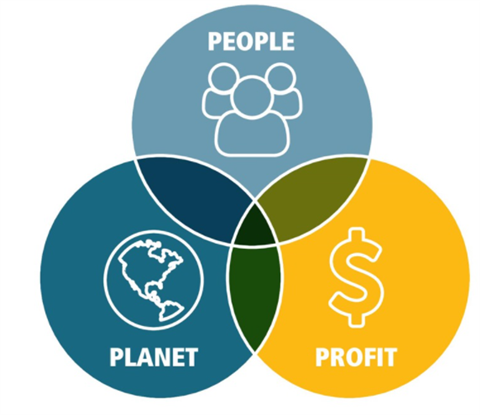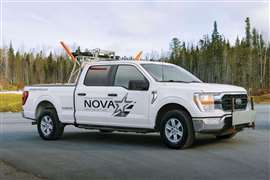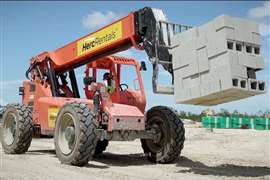How to improve sustainable practices in rental
02 August 2021
When it comes to sustainability in the equipment rental sector, Kevin Appleton says businesses should stop the virtue-signalling and look for meaningful actions.
Several years ago I sat in an industry meeting where someone suggested we should do more to promote and focus on sustainability.
At the time, and to my discredit, I responded that I thought this word was … well, what you might expect from the far end of a bull!

My position has substantially shifted in the intervening years, although I still have some reservations. Let me share my journey with you.
Historical attitudes towards sustainability
Back then, sustainability was a word that was almost uniquely linked with issues of environmental impact.
My issue with the word as used at that time was that, as an industry, our largest impacts on the environment were to do with equipment emissions and that these emissions, in turn, were largely governed by manufacturers’ decisions.
In turn, manufacturers’ decisions were largely guided by governmental regulations around engine and fuel types.
In this scenario, it seemed to me, the role of the equipment rental industry would be to simply make pious-sounding noises around environmental impacts.
Additionally, the rental industry could claim to offer some wider environmental benefit if more construction companies chose temporary ownership (rental) of equipment over owning under-utilised – and often more polluting – own fleets.
I had, and still have, a disinclination to take positions that sound overly pious and self-serving, whilst changing nothing fundamental about one’s own behaviour, and that was why I held to a position of cynicism.
In the intervening years sustainability has widened as a concept.
Sustainability as a concept
Rather than being seen as a synonym for reduced environmental impact it has come to include things such as how businesses interact with the hot topics of the societies around them and with the kinds of employment practices it supports or tacitly condones within its supply chain.
From meaning one thing it has expanded to a point where it can mean almost anything.
This too, it seems to me, is a problem. It is this kind of approach that sees businesses jumping on to particular social-movement bandwagons by doing little more than adding ever-changing, virtue-signalling messages and frames to websites and company social media.
This approach, in my opinion, also belongs at the tail end of a bull.
What does sustainability really mean?
Sustainability, if it means anything, is literally about doing things in a way which is durable and minimises avoidable harm to the world around us.
It means, surely, acting such that, were we to continue to act in that way for 100 years, the world would be a better place than it is today – environmentally, socially and culturally.
But here’s the rub. Some of those things, if we are serious, mean certain pain now for possible gain tomorrow. They might even mean certain pain for me but potential gain for my (or someone else’s) grandchildren.
That is not the premise on which the vast majority of businesses work. While one of our unique characteristics, as a species, is our ability to delay our own gratification - to suffer things now so that we might benefit later.
This has always largely been taken to work at a personal level – I can choose to work extremely hard for several years now, which I won’t always enjoy, so that I can relax later, which I will (or so I think) enjoy.
If the deal was, instead, that I should run a lifetime of marathons so that my grandkids might, in their future old age, sit and eat ice-cream, I’d be much less motivated.
The goal of sustainability in business
The goal, then, has to be that we find programmes which incrementally improve (or at least don’t destroy) our businesses in the here and now whilst also making the world around us better.
We have already seen substantial shifts in the emissions efficiency of equipment and transport. This seems set to continue, driven by pressure from governments around the world.
There is less global poverty now than ever in history and, whilst there are still substantial income inequalities in developed countries, these are much less than they were before the second world war. There is progress even amongst the salaciously-reported gloom.
How to create sustainable business practices
The role for us in business is to find areas where we can make a difference, without voting ourselves out of existence.
Successful businesses - regardless of industry - are the best guarantee against a return to global poverty and so we need to tread purposefully but with wisdom.
Indeed, asking some key questions can help us take actions within our businesses that are both sustainable and practical.
5 Key questions equipment rental companies should ask
- What can WE do to eliminate relative poverty for people who work within our business?
- How can WE ensure everyone in our business gets a fair chance to prosper?
- How can WE favour manufacturers who produce the cleanest equipment?
- How can WE dispose of our equipment responsibly, whilst ensuring it has the longest possible working life?
- How can WE ensure we generate as little waste as possible?
These are limited and practical questions which will provide more than enough fuel for hard work and soul-searching.
If we can focus on fixing these for ourselves then the aggregate effect will be stunning. It is a religious truism that the process of reformation has to start with ourselves.
This, as opposed to public virtue-signalling, is what makes the difference between bull excrement and genuine, purposeful, endeavour in the area of sustainability.
* This article was originally published under the title ‘Sustainability: What’s in a word’ in the July-August 2021 edition of IRN magazine. To download it and or other issues, click here.

Kevin Appleton is an experienced senior executive and advisor in the equipment rental, logistics and construction service industries. He is a former CEO of Lavendon Group and a chairman and/or non-executive director of a number of companies in the rental and logistics sectors. To comment on these articles, e-mail: IRNfeedback@khl.com |






